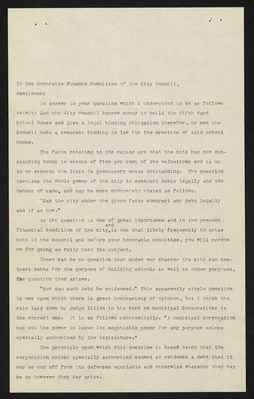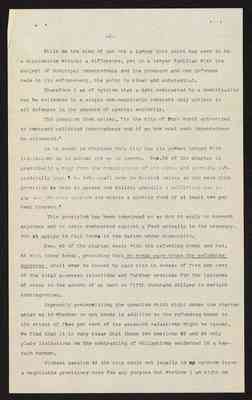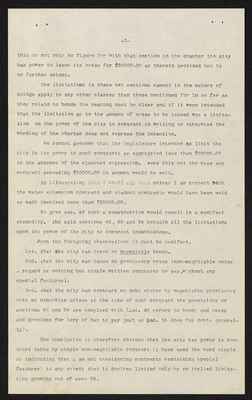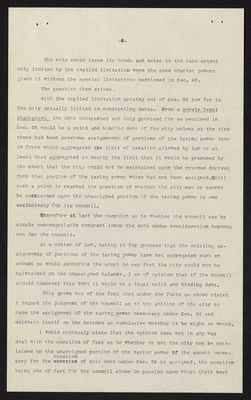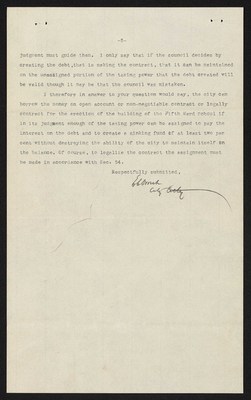Pages
91
To the Honorable Finance Committee of the City Council,
Gentlemen:
In answer to your question which I understood to be as follows to-wit: Can the City Council borrow money to build the Fifth Ward School House and give a legal binding obligation therefor, or can the Council make a contract binding in law for the erection of said school house.
The facts relating to the matter are that the city has now outstanding bonds in excess of five per cent of the calculations and is up to or exceeds the limit in promissory notes outstanding. The question involves the whole power of the city to contract debts legally and the manner of same, and may be more concretely stated as follows.
"Can the city under the given facts contract any debt legally and if so how."
As the question is one of great importance and in the present financial condition of the city and is one that likely frequently to arise both in the council and before your honorable committee, you will pardon me for going so fully into the subject.
There can be no question that under our charter the city can contract debts for the purpose of building schools as well as other purposes. The question then arises.
"How can such debt be evidenced." This apparently simple question is one upon which there is great contrariety of opinion, but I think the rules laid down by Judge Dillon in his work on Municipal Corporations is the correct one. It is as follows substantially. "A municipal corporation has not the power to issue its negotiable paper for any purpose unless specially authorized by the legislature."
The principle upon which this doctrine is based being that the corporation unless specially authorized cannot so evidence a debt that it may be cut off from its defenses equitable and otherwise whatever they may be or however they may arise.
92
-2-
While th the mind of one not a lawyer this point may seem to be a distinction without a difference, yet to a lawyer familiar with the subject of municipal indebtedness and the thousand and one defenses made to its enforcement, the point is clear and substantial.
Therefore I am of opinion that a debt contracted by a municipality may be evidenced by a simple non-negotiable contract only subject to all defenses in the absence of special authority.
The question then arises, "Is the city of Fort Worth authorized to contract unlimited indebtedness and if so how much such indebtedness be evidenced."
As is usual in charters this city has its powers hedged with limitations as to amount and as to manner. Sec.54 of the charter is practically a copy from the constitution of the state and provides substantially that " no debt shall ever be created unless at the same time provision be made to assess and collect annually a sufficient sum to pay the interest thereon and create a sinking fund of at least two per cent thereon."
This provision has been construed so as not to apply to current expenses and to debts contracted against a fund actually in the treasury, but it applys in full force to the matter under discussion.
Sec. 45 of the charter deals with the refunding bonds and Sec. 46 with other bonds, providing that no bonds save those for refunding purposes shall ever be issued by said city in excess of five per cent of the total assessed valuations and further provides for the issuance of notes to the amount of as much as fifth thousand dollars in certain contingencies.
Expressly pretermitting the question which might under the charter arise as to whether or not bonds in addition to the refunding bonds to the extent of five per cent of the assessed valuations might be issued, we find that it is very clear that these two sections 45 and 46 only place limitations on the contracting of obligations evidenced in a certain manner.
Without section 46 the city could not legally in my opinion issue a negotiable promissory note for any purpose but whether I am right on
93
-3-
this or not cuts no figure for with that section in the charter the city has power to issue its notes for $5000.00 as therein provided but to no further extent.
The limitations in these two sections cannot in the nature of things apply to any other classes than those mentioned for in so far as they relate to bonds the meaning must be clear and if it were intended that the limitation as to the amount of notes to be issued was a limitation on the power of the city to contract in writing or otherwise the wording of the charter does not express the intention.
We cannot presume that the legislature intended to limit the city in its power to such contracts as aggregated less than $5000.00 in the absence of the clearest expression. Were this not the case any contract exceeding $5000.00 in amount would be void.
As illustrating this I would say that unless I am correct both the Water extension contract and viaduct contracts would have been void as each involved more than $5000.00.
To give sec. 46 such a construction would result in a manifest absurdity. The said sections 45, 46 and 54 contain all the limitations upon the power of the city to contract indebtedness.
From the foregoing observations it must be manifest.
1st. That the city can issue no negotiable bonds.
2nd. That the city can issue no promissory notes (non-negotiable notes I regard as nothing but simple written contracts to pay, without any special features).
3rd. That the city can contract no debt either by negotiable promissory note or otherwise unless at the time of such contract the provisions of Sections 48 and 54 are complied with (Sec. 48 refers to bonds and notes and provides for levy of tax to pay just as Sec. 54 does for debts generally).
The conclusion is therefore obvious that the city has power to contract debts by simple non-negotiable contract (I have used the word simple as indicating that I am not considering contracts containing special features) to any extent that it desires limited only by an implied limitation growing out of Sec. 54.
94
-4-
The city could issue its bonds and notes to the same extent only limited by the implied limitation were the same charter powers given it without the special limitations mentioned in Sec. 46.
The question then arises.
With the implied limitation arising out of Sec. 54 how far is the city actually limited in contracting debts. From a purely legal standpoint the debt contracted and duly provided for as required in Se. 54 would be a valid and binding debt of the city unless at the time there had been previous assignments of portions of the taxing power then in force which aggregated the limit of taxation allowed by law or at least that aggregated so nearly the limit that it would be presumed by the court that the city could not be maintained upon the revenue derived from that portion of the taxing power which had not been assigned. Until such a point is reached the question of whether the city can or cannot be maintained upon the unassigned portion of the taxing power is one exclusively for its council.
Therefore it last the question as to whether the council can by simple non-negotiable contract incur the debt under consideration becomes one for the council.
As a matter of law, taking it for granted that the existing assignments of portions of the taxing power have not aggregated such an amount as would authorize the court to say that the city could not be maintained on the unassigned balance, I am of opinion that if the council should contract this debt it would be a legal valid and binding debt.
This grows out of the fact that under the facts as above stated I regard the judgment of the council as to the ability of the city to make the assignment of the taxing power necessary under Sec. 54 and maintain itself on the balance as conclusive whether it be right or wrong.
I would expressly state that the opinion does not in any way deal with the question of fact as to whether or not the city can be maintained on the unassigned portion of the taxing power if the amount necessary for the creation of this debt under Sec. 54 is assigned, the question being one of fact for the council alone in passing upon which their best .
95
-5-
judgment must guide them. I only say that if the council decides by creating the debt,that is making the contract, that it can be maintained on the unassigned portion of the taxing power that the debt created will be valid though it may be that the council was mistaken.
I therefore in answer to your question would say, the city can borrow the money on open account or non-negotiable contract or legally contract for the erection of the building of the Fifth Ward School if in its judgment enough of the taxing power can be assigned to pay the interest on the debt and to create a sinking fund of at least two per cent without destroying the ability of the city to maintain itself on the balance. Of course, to legalize the contract the assignment must be made in accordance with Sec. 54.
Respectfully submitted,
E.C. Orrick City Atty
